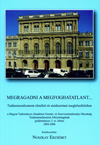
- Szerkesztette: Noszkay Erzsébet
- Kiadó: N & B. Kiadó
- Kiadás dátuma:2006.
- ISBN:10 963-06-1346-8

Cím: The capital of intelligence - the intelligence of capital
Kiadó: Infota
Kiadás éve: 2009 március
Oldalak száma: 291
Cím: Knowledge Distribution in Paradigm Shift
Írta:Klára Hajnal
Oldalszám:41 - 64The evolutionary model of modern societies that promotes growth is built on supernatural and superhuman powers. Economic growth cannot be sustained on a planet whose resources are limited, therefore the social principle leads humankind into such a deep global crisis that requires the reassessment of the essence of civilisation. The only way to solve the crisis is a paradigm shift, we would need to accomplish a qualitative development and transformation, and fundamentally change the interaction between social and economic systems and their physical and spiritual relations to nature. Our knowledge has to respect every forms of life, and serve creative cooperation. We would need to use our knowledge in an intelligent way, we would need to perceive intelligent knowledge whose essence is that we are able to recognise social, economic and environmental changes, the direction of the Universe and the Earth’s evolution and efficiently adapt to all of them.
Cím: Logos and the creative process – Developing a larger perspective that holds the space for creation and innovation. Pathways from the „I” to the „we”
Írta:Ágota Ruzsa
Oldalszám:141 - 148.
This is a personal essay on the relationship of the global shift we are taking part in and its relevance to knowledge generation and its methods we have already created so that we can place ourselves as companies and Her individuals, Her teams and communities in a creative and interactive cauldron of co-creation, that naturally and continuously produces ideas for innovation, renewal and self-transcendence just like all other living organisms. We will touch on some insights of the Old Traditions, inspiring outcomes of New Science and a collective effort of several communities of practice to design living communication methods to facilitate our organisations into this direction of co-creation.
Cím: The Role of Networks in Learning and Knowledge-Flow
Írta: Éva Virág Suhajda
Oldalszám: 245 - 256
Social networks in the era of network community portals are self-evident. However our knowledge of how networks work, and how network science can be used for creating better network communication is not self-evident. This study aims at finding our biological origins of thinking in networks, and the way networking mechanism sets our personal learning process, and how network phenomena formulate our behaviour and learning in groups, in organizations and between organizations. This paper aims to be interdisciplinary with the weakness of superficiality of a short interdisciplinary work – it itself networks the following sciences: mathematics, neural biology, cognitive psychology, pedagogy, social psychology, psychiatry, sociology and management sciences.









